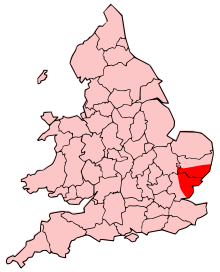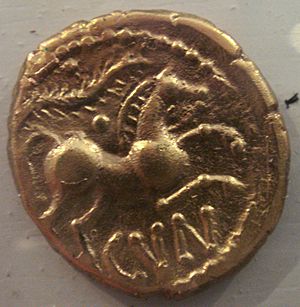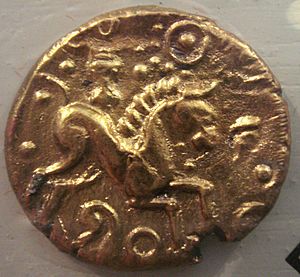Trinovantes facts for kids
Quick facts for kids Trinovantēs or Trinobantes |
|
 |
|
| Geography | |
| Capital | Camulodunon (Colchester) |
|---|---|
| Location |
|
| Rulers | |
The Trinobantes were an important Celtic tribe in ancient Britain. They lived in what is now Essex, Hertfordshire, and Suffolk, north of the River Thames. Their neighbors were the Iceni to the north and the Catuvellauni to the west. Their name might mean 'the very vigorous people' or 'newcomers'. Their main town was Camulodunum, which is now Colchester. Some people even think it might have been the legendary Camelot!
Contents
The Trinobantes and Roman Invasion
Before Julius Caesar's invasions in 55 and 54 BC, the Trinobantes were seen as one of the strongest tribes in Britain. At that time, their main town was probably at Braughing in Hertfordshire.
Their king, Imanuentius, was overthrown by Cassivellaunus. Cassivellaunus was likely from the powerful Catuvellauni tribe. Imanuentius's son, Mandubracius, escaped to Gaul and asked Julius Caesar for help.
During his second invasion, Caesar defeated Cassivellaunus. He then helped Mandubracius become king of the Trinobantes again. Cassivellaunus promised not to bother Mandubracius anymore. The Trinobantes also agreed to pay tribute to the Romans.
Later Kings and Challenges
The next known king of the Trinobantes was Addedomarus. He became king around 20–15 BC. Addedomarus moved the tribe's capital to Camulodunum (modern Colchester).
For a short time around 10 BC, Tasciovanus, a king from the Catuvellauni tribe, took control of Camulodunum. This suggests he had conquered the Trinobantes. However, he soon had to leave, possibly because the Romans put pressure on him. Addedomarus then became king again.
Addedomarus was briefly followed by his son, Dubnovellaunus, around 10–5 BC. But a few years later, the Trinobantes were fully conquered. This happened either under Tasciovanus or his son, Cunobelinus.
Some of these kings, like Addedomarus and Dubnovellaunus, appear in later British legends. They are known as Aedd Mawr and Dyfnwal Moelmut.
Joining Boudica's Revolt
The Trinobantes reappeared in history during Boudica's famous revolt in 60 AD. They joined Boudica and the Iceni tribe in fighting against the Roman Empire.
After the revolt, the Romans organized Britain into different areas called civitates. The Trinobantes gave their name to one of these areas. Its main town was Caesaromagus, which is now Chelmsford in Essex.
The way the Trinobantes buried their dead, with rich items, shows they had connections to people from mainland Europe, specifically the Belgae.
Later, a writer named Geoffrey of Monmouth used the name Trinovantum for London in his stories. He claimed it meant "New Troy". This connected London to the legend that Britain was founded by Brutus and other people who escaped the Trojan War.
Popular Culture
In the British TV show Chelmsford 123, the character Badvoc, played by Rory McGrath, was the leader of the Trinobantes.
 | Roy Wilkins |
 | John Lewis |
 | Linda Carol Brown |



